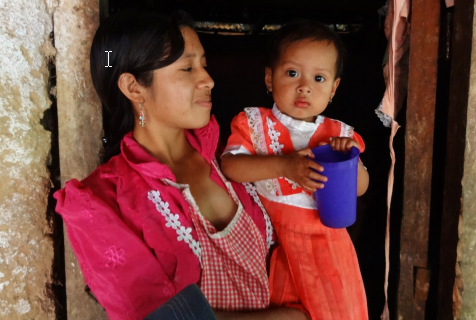Yolanda is a resident of Oquen, a community located in the dry corridor of Comotan in Chiquimula. She is a very hard working woman and always takes part in community activities. Although Yolanda is only 34 years old, she has lived a lifetime. She married quite young to Manuel and has 7 children – 4 girls, and 3 boys. Before her last pregnancy she would make jokes that 6 children were enough because 3 girls and 3 boys made three pairs but in her community there is a stigma against the use of family planning methods and now Yolanda has another girl to care for.
For Yolanda there is no such thing as a holiday, or a day off, or a day to herself. She gets up every day before sunrise at 4:30 in the morning from Monday to Sunday. The first things she does are to light the fire, grind the corn and make tortillas and coffee. This will be breakfast for the whole family, all done while they sleep. Yolanda can be seen, baby on her back, going to fetch water at the well. She is accompanied by one of her oldest daughters who is carrying the washing and the containers for water. To fetch water, they must walk for two hours over the dry, hilly land of her community. She walks quickly. It is as if her feet do no touch the ground. When she arrives at the well, she joins other women who form a line and take their turn at the well. There are many women and little water. They spend the morning in this way. She arrives back home by noon where she makes lunch for Manuel and the children who have returned from school.
In the afternoon, Yolanda continues with her chores, cleaning house, washing dishes, gathering wood, watering and looking after the garden, preparing corn and nixtamal, and making sure that the children do their studies, even though she herself has only a grade three education. Yolanda is the one who is responsible for feeding, caring for, keeping everyone and everything clean and watching over the education of her family. When her husband Manuel comes home, Yolanda must tell him what has gone on during the day, and then prepares supper.
By nighttime Yolanda is still not able to sit down to rest, for she must take the time to do her weaving in order to contribute to the family economy. It takes 3 or 4 days to make a hammock which she can then sell for $1.50. At ten o’clock at night, Yolanda lies down to sleep, knowing that at any moment she may be awakened by one of her children needing her care. After 17 hours of continuous work, she might get six hours of sleep. She is always alert for the needs of others.
Yolanda’s story is the story of the struggle and hard work of many peasant and Indigenous women in Guatemala. This work is not generally valued or appreciated even though it is what maintains the peasant economy.

